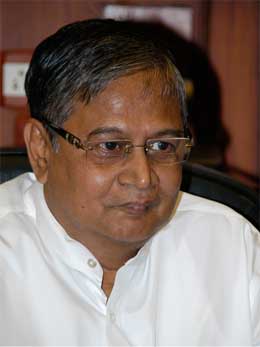By Sahana Ghosh
Kolkata–With Indian scientific institutions facing flak for failing to translate and commercialise technology from labs to the market, the government has been urged to set up a separate organisation at the academia-industry interface to enable this, says Atomic Energy Commission (AEC) Chairman Sekhar Basu.
“We have recommended there should be a separate organisation at the interface of academia and industry where we (scientific organisations) can go and offer them (the industry) the technology.
“This organisation can work at the interface between the industries who do the production and the scientists who have the technology. There is a commercial aspect to it and some technology aspect as well. That is what we exactly miss,” Basu told IANS in an interview here on the sidelines of an event.

In his address at the event organised by the Indian Institute of Metals, the head of the country’s atomic energy regulator had noted that Indian science was a “big failure” in this regard.
“Currently scientific institutions are under a lot of criticism because of the fact that our things are not going from lab to land. We are a big failure in this.”
Asked to elaborate, Basu, who is also Secretary, Atomic Energy, told IANS that scientific institutions had come together recently at a meeting to float the idea to the Central government.
“We need to do this in a commercial way. The government is doing something about it; so we will probably know and be able to take it forward,” he said.
On the nuclear technology front, Basu said India is looking forward to the operationalisation of the landmark India-Japan civil nuclear deal, which was signed in November 2016 but only came into force earlier this month.
India is the first non-member of the non-proliferation treaty to have signed such a deal with Japan. The deal clears the way for the US and French nuclear firms, which have alliances with Japanese companies, to engage in nuclear commerce with India. The Japanese technology is needed for the US and French firms to start the construction of nuclear reactors for India.
Basu says there are twin benefits of the deal: Good credit terms as well as nuclear technology.
“Japan may not be supplying reactors straight away, but we expect they may supply components to the reactor suppliers. We can get good credit terms… like the very good credit terms that are coming in for the bullet train… not only technology but also credit terms, so both together. In this (deal) we are looking for equipment and credit,” he said.
Japanese firms have major stakes in companies like America’s Westinghouse and French multinational group Areva which plan to build reactors in India. Japan’s Toshiba is a major owner of Westinghouse.
“Areva is going through financial trouble and they are going through restructuring… similarly Westinghouse is in financial trouble. Once they are ready, we will take it and we have some conditions like it should be cheap (commercially viable) and they should have a reference reactor. These two conditions have to be met,” said Basu.
Asked about the controversy over India’s entry into the Nuclear Suppliers Group, Basu said the resistance (from countries like China which argue India is not an NPT signatory) is “not making much of a difference now” due to the waiver granted to it in 2008 by the premier group to access civil nuclear technology.
However, he said, the membership is crucial for India in the long term.
“The reactors that we are buying… only because we had got the waiver. The waiver was required because we do not have uranium, we have not started mining this uranium. Now we have established that we have a lot of uranium but we have to open up those mines and mine opening takes time and there is public resistance, etc.
“All taken together it is taking time, but once we are able to do a good amount of mining… other things are not so complicated.
“If we become part of the NSG, it will help us gain better recognition and open up to the world,” he said.
“That (resistance to enter NSG) will be there. As of now it is not making much of a difference because we have got the waiver, but long term it should be there. Why should we be isolated? We are a responsible country… we have our own pride,” he added. (IANS)















